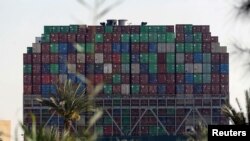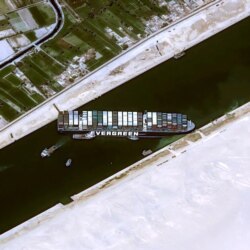Egypt's Suez Canal Authority is trying again for a third day to refloat a giant container ship that is blocking traffic in a main artery of the canal and disrupting world trade, which passes through the strategic waterway.
Egyptian media is reporting that several hundred ships are now blocked on both sides of the Suez Canal, as frantic efforts continue to try to refloat a gigantic container ship, the Ever Given, which has been wedged in a main canal artery since Tuesday.
Egyptian media says that up to 87% of the dredging work necessary to free the ship has already been performed and that it should take "a couple more days to a week, at most," to get international traffic moving in the Suez Canal, once again.
Around 50 ships a day normally pass through the canal and around 200 ships are now stranded at various points along the canal's trajectory since it became blocked Tuesday afternoon.
Said Sadek, who is an Egyptian political sociologist, tells VOA that there has been a great deal of bluster about the closure of the canal and talk about having international shipping go around southern Africa’s Cape of Good Hope, instead. Most of the talk, he argues, is "not logical.”
"Without the corona (virus) the (story of the canal's closure) would have been attracting some attention, but not with the same concern that it is drawing today," Sadek said. "It has to do with the international economy and the new alliances in the Middle East which are (forming)."
Sadek references media reports about building a new overland route between the United Arab Emirates and Israel for oil and gas shipments from the Gulf. He said he doubts that such a route is "likely to be built any time soon," and insists "the Suez Canal is much cheaper than other possible routes."
The Associated Press, however, reported that some ships are being rerouted to avoid going through the Suez Canal. AP reports that the liquid natural gas carrier Pan Americas was apparently diverted in the mid-Atlantic to the southern Africa route along the Cape of Good Hope.
A sister ship to the Ever Given, the Ever Greet, was also reportedly diverted to the southern Africa route. There may, however, be some concern that Egypt could seize the second ship in compensation for damages over the canal closure, that may have prompted the move.
Sadek said "various conspiracy theories are floating around on social media about sabotage to the ship" but that it is "most likely an act of God," given the sandstorm that was taking place when the accident occurred and "there is no proof of any sabotage."
"There was this fear that (the accident) was part of a conspiracy to close or end the Suez Canal," Sadek said. "This again is exaggerated, because this is an incident that will be resolved soon. When? It can be a few days or a week, maximum. But it is not really the end of the Suez Canal."
European media reported that the Ever Given, which is blocking the canal, may have incurred structural damage after hitting a ferry near the port of Hamburg in 2019. Egyptian authorities are also worried that the longer the ship remains wedged, the higher the chances that it incurs further damage.
The Ever Given is 400 meters long, which is longer than the width of the canal at the point where the ship is wedged, and it has around 20,000 containers on board, which could cause it to sag and damage its infrastructure.
Sadek notes that shipping insurance companies like Lloyd's of London would be responsible for damages incurred by both Egypt and the Japanese owner of the ship, "if it was determined that the accident was caused by an act of God rather than human negligence."
Egypt earns between $5 billion and $6 billion each year in revenues from the Suez Canal.





